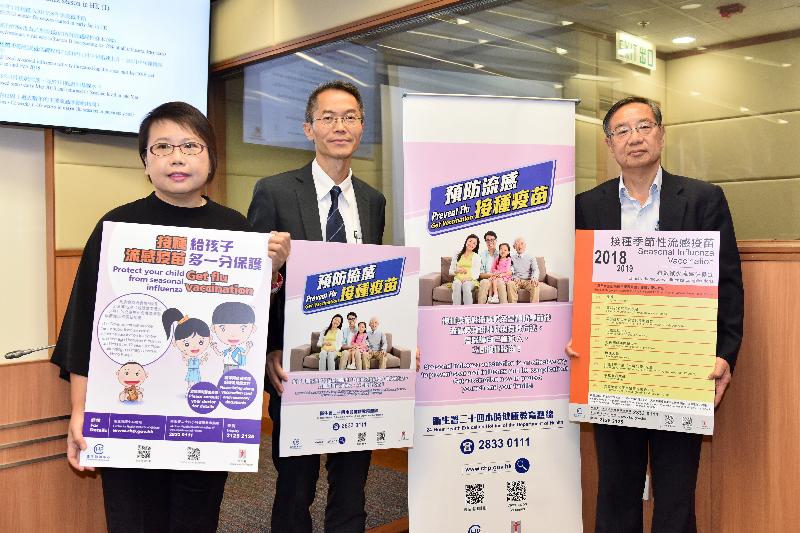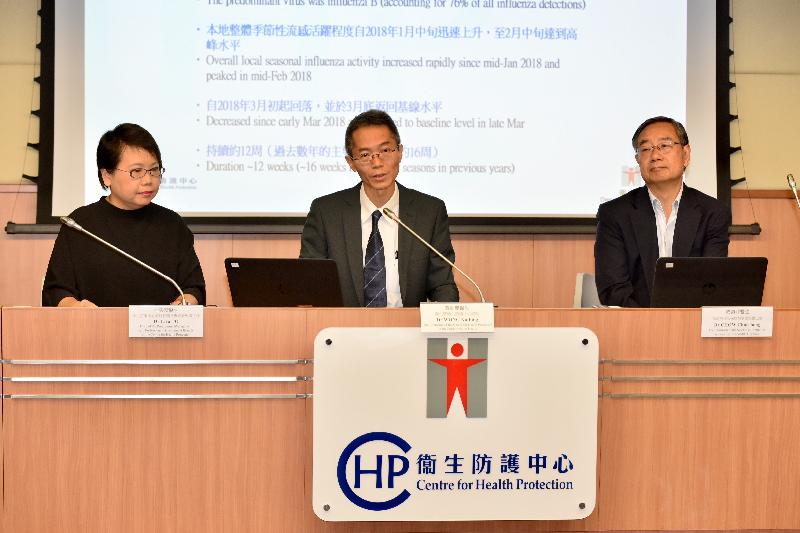2018/19 vaccination programmes to be launched in October (with photos)
**********************************************************************
Hosting a press conference today, the Controller of the CHP, Dr Wong Ka-hing, summarised the 2017/18 winter influenza season which ended in late March this year. The predominant virus was influenza B (accounting for 76 per cent of all influenza detections). Six hundred institutional influenza-like illness outbreaks had been recorded and most (73 per cent) occurred in kindergartens/child care centres and primary schools. The weekly admission rate with principal diagnosis of influenza in public hospitals was the highest among young children aged 0 to 5 (8.63 per 10 000 population at the peak), followed by elderly persons aged 65 or above (4.25) and children aged 6 to 11 (3.81).
Regarding vaccination, as of July 31, 2018, about 337 000 doses of SIV had been administered via the VSS and 482 000 doses had been administered to eligible groups under the GVP in 2017/18, representing an increase of 16.7 per cent as compared to the total number of doses administered in 2016/17.
Dr Wong said, "Vaccination is one of the most effective ways to prevent seasonal influenza and its complications. To further enhance the vaccination rate of the community and in particular to encourage vaccination among schoolchildren, the DH has introduced a number of new initiatives in the 2018/19 SIV programmes."
While the VSS will be expanded to cover those aged 50 to 64 to receive subsidised SIV (see Annex 1) in the private sector in 2018/19, the eligible groups and arrangements for free SIV in the public sector under the GVP in 2018/19 will remain unchanged (see Annex 2).
"Taking into consideration of the recommendation of the Scientific Committee on Vaccine Preventable Diseases (SCVPD), we have extended the coverage of the VSS in 2018/19 to Hong Kong residents aged 50 or above, from the elderly aged 65 or above, increasing the number of beneficiaries of the scheme by about 1.8 million. In parallel, the subsidy for SIV under the VSS will also be increased from $190 to $210 per dose for all eligible groups," Dr Wong added.
To increase the SIV uptake rate among primary school children, Dr Wong pointed out that the DH will launch the School Outreach Vaccination Pilot Programme for primary schools this year to reach out to 184 primary schools and provide SIV to their students through a Government Outreach Team or a Public-Private-Partnership (PPP) Team. The pilot programme will start on October 22.
Under the pilot programme, the DH will arrange procurement and delivery of vaccines, and collection of unused vaccines and clinical waste, as well as provide administrative support. A total of 36 doctors were recruited to participate in the PPP. An injection fee of $70 per dose will be provided to the PPP doctors.
Primary schools were randomly assigned by computer to these doctors. Due to the limited quota, schools with more students were accorded higher priority under the pilot programme in order to benefit a greater number of students and maximise public health and the disease prevention impact. The DH has also tried to ensure that schools in each of the 18 districts can take part.
"The Government has procured a total of 752 000 doses of SIV for the GVP and the pilot programme this year, including 138 000 doses for the latter. The DH has also informed doctors participating in the VSS in May this year about the new arrangement in 2018/19, and reminded and assisted them to make preparations and place vaccine orders in a timely manner," Dr Wong said.
Also present at the press conference, the Head of the CHP's Programme Management and Professional Development Branch, Dr Liza To, added that the VSS outreach vaccination at primary schools, kindergartens and child care centres will also be enhanced this year to further encourage vaccination among schoolchildren. Schools not participating in the pilot programme are urged to arrange as early as possible outreach vaccination for their students through the enhanced programme.
Under the Enhanced VSS Outreach Vaccination, schools can invite participating doctors from a list published on the CHP's website to arrange outreach SIV service at their campus. No tendering will be required by the schools and no extra service fees will be charged by the doctors to schools or students. The Government will provide a higher subsidy of $250 per dose and a special subsidy of $800 for clinical waste disposal per outreach vaccination activity to participating doctors.
The Chairman of the SCVPD, Dr Chow Chun-bong, also spoke at the press conference, reporting that the SCVPD had earlier endorsed that the composition of the recommended vaccines for the 2018/19 influenza season should be in line with the World Health Organization (WHO)'s latest recommendations. The quadrivalent influenza vaccines to be used in the 2018/19 Northern Hemisphere (NH) influenza season contain:
* A/Michigan/45/2015 (H1N1)pdm09-like virus;
* A/Singapore/INFIMH-16-0019/2016 (H3N2)-like virus;
* B/Colorado/06/2017-like virus (B/Victoria/2/87 lineage); and
* B/Phuket/3073/2013-like virus (B/Yamagata/16/88 lineage).
The influenza B virus component of trivalent influenza vaccines recommended for use in the 2018/19 NH influenza season should be a B/Colorado/06/2017-like virus of the B/Victoria/2/87 lineage.
Currently, two types of SIV are registered in Hong Kong, namely inactivated influenza vaccines (IIV) and live attenuated influenza vaccine (LAIV). Both trivalent and quadrivalent IIVs are recommended to be used in Hong Kong. SIV contains ovalbumin (a chicken protein), but the manufacturing process involves repeated purification and the ovalbumin content is very little. People who are allergic to eggs are generally safe to receive vaccination. Individuals with a history of severe allergic reaction to egg should have SIV administered by health care professionals in appropriate medical facilities with capacity to recognise and manage severe allergic reactions.
LAIV contains live attenuated viruses and is given intranasally. It can be used for people aged 2 to 49 but is generally contraindicated in the following conditions:
- History of severe allergic reaction to any vaccine component or after a previous dose of any influenza vaccine;
- Concomitant aspirin or salicylate-containing therapy in children and adolescents;
- Children aged 2 to 4 who have been diagnosed with asthma, or whose health care provider has reported during the preceding 12 months that the child had wheezing or asthma, or whose medical record indicates a wheezing episode has occurred during the preceding 12 months;
- Children and adults who are immunocompromised due to any cause;
- Close contacts and caregivers of severely immunosuppressed persons who require a protected environment;
- Pregnancy; and
- Receipt of influenza antiviral medication within the previous 48 hours.
Dr Chow said, "Influenza can cause serious illnesses in high-risk individuals and even healthy persons. Given that influenza vaccines are safe and effective, all persons aged 6 months or above, except those with known contraindications, are recommended to receive SIV for personal protection. Based on past epidemiological patterns, the winter influenza season usually occurs from January to March/April each year. As it takes about two weeks to develop antibodies, members of the public are advised to receive SIV early for protection against seasonal influenza."
Dr Chow also noted that the SCVPD has recently reviewed the local epidemiology, scientific literature and overseas practice related to school closure arrangements due to seasonal influenza. He said, "The SCVPD concluded that there is no scientific basis to establish local criteria for territory-wide school closure due to seasonal influenza epidemics."
As for individual schools, the SCVPD recommended that closure of an individual school with influenza or influenza-like illness outbreaks may be considered taking reference from the following indicators: (i) any death of healthy children in the school due to influenza; (ii) two or more children requiring intensive care unit admission due to influenza; or (iii) the influenza-like illness attack rate among children is 20 per cent or more.
In addition, factors including the number of staff affected (which may potentially affect operation of the school), the epidemic trend of the outbreak and the effectiveness of control measures should also be taken into consideration.
"While there is no international consensus or guidelines for the closure duration regarding reactive closure of an individual school due to influenza outbreak, the SCVPD believes that a seven-day closure would suffice to interrupt transmission within an affected school taking into consideration the incubation period and the period of communicability of seasonal influenza," Dr Chow added.
Meanwhile, the DH announced that the existing arrangements for free or subsidised pneumococcal vaccination (PV) for eligible elderly persons (see Annex 3) will be continued in 2018/19. Those aged 65 or above who do not have high-risk conditions will be eligible for one dose of 23-valent polysaccharide pneumococcal vaccination (23vPPV). Elderly persons with high-risk conditions who have not received PV before will be eligible for one dose of 13-valent pneumococcal conjugate vaccine (PCV13) and one dose of 23vPPV one year later.
While the subsidy level of PCV13 will remain at $730 per dose, the subsidy of 23vPPV will be increased from $190 to $250 per dose for participating VSS doctors.
The CHP has been holding meetings and briefings with relevant stakeholders including health care providers, community partners and the educator sector to inform them of the arrangements and encourage their participation in the vaccination programmes. Publicity will also be stepped up to promote vaccination among eligible groups.
For more details of the vaccination programmes, the public may call the CHP's hotline (2125 2125) or visit the CHP's Vaccination Schemes page.
Ends/Friday, August 10, 2018
Issued at HKT 16:30
Issued at HKT 16:30
NNNN






